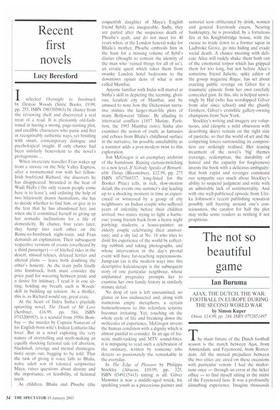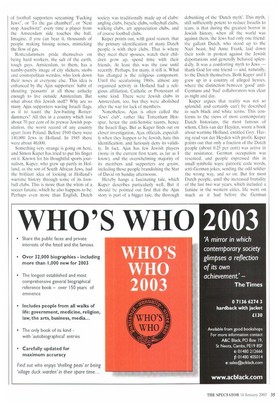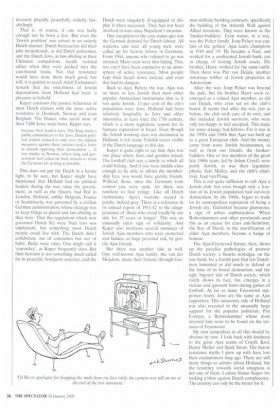The not so beautiful game
Ian Buruma
AJAX, THE DUTCH, THE WAR: FOOTBALL IN EUROPE DURING THE SECOND WORLD WAR by Simon Kuper Orion, £14.99, pp. 244, ISBN 0752851497 The main fixture of the Dutch football season is the match between Ajax, from Amsterdam, and Feyenoord. from Rotterdam. All the mutual prejudices between the two cities are aired on these occasions with particular venom. I had the misfortune once — through an error at the ticket office — to find myself sitting in the midst of the Feyenoord fans. It was a profoundly disturbing experience. Imagine thousands
of football supporters screaming 'Fucking Jews?", or To the gas chamber!', or 'Next stop Auschwitz!' every time a player from the Amsterdam side touches the ball, Imagine, if you can bear it, thousands of people making hissing noises, mimicking the flow of gas.
Rotterdammers pride themselves on being hard workers, the salt of the earth, tough guys. Amsterdam, to them, has a namby-pamby image of city slickers, snobs and cosmopolitan weirdos, who look down their noses at everyone else. This idea is enhanced by the Ajax supporters' habit of shouting 'peasants' at all those unlucky enough to live outside Amsterdam. But what about this Jewish stuff? Why are so many Ajax supporters waving Israeli flags, as if to taunt the Jew-baiting Rotterdammers? All this in a country which lost about 70 per cent of its prewar Jewish population, the worst record of any country apart from Poland. Before 1940 there were 140.000 Jews in Holland. In 1945 there were about 40,000.
Something very strange is going on here, and Simon Kuper has tried to put his finger on it. Known for his thoughtful sports journalism, Kuper, who grew up partly in Holland, as the son of South African Jews, had the brilliant idea of looking at Holland's wartime history through some of its football clubs. This is more than the whim of a soccer fanatic, which he also happens to be. Perhaps even more than English. Dutch society was traditionally made up of clubs: angling clubs, bicycle clubs, volleyball clubs, walking clubs, art appreciation clubs, and of course football clubs.
Kuper points Out, with good reason, that the primary identification of many Dutch people is with their clubs. That is where they meet their spouses, watch their children grow up, spend time with their friends. At least this was the case until recently. Perhaps, for many, it still is. What has changed is the religious component. Until the secularising 1960s, almost any organised activity in Holland had a religious affiliation, Catholic or Protestant of some kind. There were Jewish clubs in Amsterdam, too, but they were abolished after the war for lack of members.
Nonetheless. Ajax is often called the 'Jews' club', rather like Tottenham Hotspur, hence the anti-Semitic taunts, hence the Israeli flags. But as Kuper finds out on closer investigation, Ajax officials, especially when they happen to be Jewish, hate this identification, and furiously deny its validity. In fact, Ajax has few Jewish players (none in the current first team, as far as I know), and the overwhelming majority of its members and supporters are goyim, including those people brandishing the Star of David on Sunday afternoons.
Hereby hangs a fascinating tale, which Kuper describes particularly well. But it should be pointed out first that the Ajax story is part of a bigger tale, the thorough debunking of the 'Dutch myth'. This myth, still sufficiently potent to reduce Israelis to tears, is that during the greatest horror in Jewish history, when all the world was against them, the Jews had only one friend: the gallant Dutch, who stood up to the Nazi beast, hid Anne Frank, laid down their tools in protest against the Jewish deportations and generally behaved splendidly. It was a comforting myth to Jews — thank God for one friend — and, naturally, to the Dutch themselves. Both Kuper and I grew up in a country of alleged heroes, where the distinction between 'good' antiGermans and 'bad' collaborators was clear as night and day.
Kuper argues that reality was not so splendid, and certainly can't be described in such black and white terms. This conforms to the views of most contemporary Dutch historians, the most famous of whom, Chris van der Heyden, wrote a book about wartime Holland, entitled Grey. Having read van der Heyden with profit, Kuper points out that only a fraction of the Dutch people (about 0.25 per cent) was active in the resistance. German occupation was resented, and people expressed this in small symbolic ways: patriotic code words, anti-German jokes, sending the odd soldier the wrong way, and so on. But for most Dutch people, until the increased brutality of the last two war years, which included a famine in the western cities, life went on much as it had before the German
invasion: placidly, peacefully, orderly, lawabidingly.
That is, of course, if one was lucky enough not be born a Jew. But even the 'Jewish problem' was solved in an orderly Dutch manner. Dutch bureaucrats did their jobs meticulously, as did Dutch policemen, and the Dutch Jews, as law-abiding as their Christian compatriots, hardly resisted either when they were pushed into the east-bound trains. Not that resistance would have done them much good, but still, it is painful to recall Adolf Eichmann's remark that the orderliness of Jewish deportations from Holland had been 'a pleasure to behold'.
Kuper contrasts the passive behaviour of most Dutch citizens with the more active resistance in Denmark, Norway and even Belgium. The Danes, who saved most of their 7,800 Jews, were brave, Kuper says,
because their leaders were. The King made a public commitment to the Jews. Danish political leaders refused to take even the mildest measures against them, pastors read a letter in church opposing their persecution ... It was similar in Norway, where king and government had called on their citizens to resist the Germans for as long as possible.
This does not put the Dutch in a heroic light, to be sure, but Kuper might have mentioned that Holland had no political leaders during the war, since the government, as well as the Queen, had fled to London. Holland, unlike Belgium, France or Scandinavia, was governed by a civilian German administration, whose strategy was to keep things as placid and law-abiding as they were. That the regulations which now governed Dutch life were Nazi laws was unpleasant, but something most Dutch people could live with. The Dutch didn't collaborate out of conviction but out of habit. Rules were rules. One might call it 'cowardice', as Kuper frequently does. But then heroism is not something much called for in peaceful, bourgeois societies, and the
Dutch were singularly ill-equipped to display it when necessaiy. They had not been involved in wars since Napoleon's invasion.
One exception to the easy status quo was the German demand for Dutch labour. All students, and later all young men, were called up for factory labour in Germany. From 1944, anyone who refused to go was arrested. Many men went into hiding. This, too, can't have been conducive to an atmosphere of active resistance. Most people kept their heads down instead, and even that had its dangers.
Back to Ajax. Before the war, Ajax was no more or less Jewish than most other popular Amsterdam institutions; that is, it was quite Jewish. 13 per cent of the city's population were Jews. Holland had been relatively hospitable to Jews and other minorities, at least since the 17th century, which is a more legitimate reason for its humane reputation in Israel. Even though the Jewish working class was decimated in Holland, it left many Yiddish traces visible in the Dutch language to this day.
Kuper is quite right to say that Ajax was one place where Jews and gentiles mixed. The football club was a family to which all could belong. And if you were middle-class enough to be able to afford the membership fees, you would have gentile friends. Without those, once the Germans took control you were sunk, for there was nowhere to find refuge. Like all Dutch institutions, Ajax's wartime record is patchy, indeed grey. There is a reference in its annual report of 1941-42 to the disappearance of 'those who stood loyally by our side for 35 years or longer'. This was an unusually open sign of solidarity. And Kuper also mentions several instances of Jewish Ajax members who were protected and hidden, at huge personal risk, by gentile Ajax friends.
But there was another side as well. One well-known Ajax family, the van der Meijclens, made their fortune through Ger
man military building contracts, specifically the building of the Atlantik Wall against Allied invasions. They were known as the 'bunker-builders'. Even worse, in a way, was the Pelser family. Joop Pelser was captain of the 'golden' Ajax team, champions in 1918 and '19. He became a Nazi, and worked for a confiscated Jewish bank, put in charge of looting Jewish assets. His brother, Harry, worked for the same outfit. Then there was Piet van Deijck, another notorious robber of Jewish properties in Amsterdam.
After the war, Joop Pelser was beyond the pale, but his brother Harry soon reemerged as a valued Ajax member, as did van Deijck, who even sat on the club's board. It seems that after the war, just as before, the club took care of its own, and this included Jewish survivors, who were only too happy to feel accepted. This made for some strange bed-fellows. For it was in the 1950s and 1960s that Ajax was built up as a great European club. And the money came from some Jewish businessmen, as well as from our friends, the bunkerbuilders. One or two members of the great late 1960s team, led by Johan Cruyff, were partly Jewish, as was their legendary physio, Salo Muller, and the club's chairman, Jaap van Praag.
This is not quite sufficient to call Ajax a Jewish club, but even though only a fraction of its Jewish population had survived, Amsterdam, by the 1960s, began to trade On its cosmopolitan reputation of being a Jewish city. Yiddishkeit became glamorous, a sign of urban sophistication. When Rotterdammers and other provincials used this as an excuse for crass anti-Semitism, the Star of David, to the mortification of older Ajax members, became a badge of honour.
The Ajax-Feyenoord fixture, then, shows up the peculiar pathologies of postwar Dutch society: a bizarre nostalgia, on the one hand, for a Jewish past that few Dutchmen lamented or did much to defend at the time of its brutal destruction, and the ugly, bigoted side of Dutch society, which rarely shows its face, but emerges in a vicious and ignorant form during games of football. As far as many Feyenoord supporters know, Jews are the same as Ajax supporters. This unsavoury side of Holland was also revealed in the unusually large support for the populist politician, Pins Fortuyn, a Rotterdammer whose most devoted fans were to be found on the terraces of Feyenoord.
My own sympathies in all this should be obvious by now. I look back with fondness to the great Ajax teams of Cruyff. Krol. Benny Muller and Sjaak Swart. The heroic resistance myths I grew up with have lost their enchantment long ago. There are still many things to admire about Holland, but the tendency towards social smugness is not one of them. I salute Simon Kuper for striking a blow against Dutch complacency. The country can only be the better for it.




























































 Previous page
Previous page